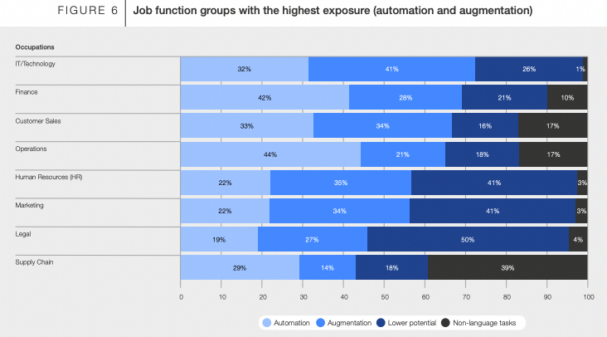This year I had the pleasure of joining world leaders, business titans, and changemakers at the 54th World Economic Forum in Davos to grapple with complex challenges that demand collective action. It was validating to see that AI wasn’t just a fringe topic – it was the protagonist.
We clearly saw how much potential AI holds to help create and foster new business opportunities, forge stronger partnerships, find new avenues for dialogue, and achieve more efficient use of emerging technologies. From climate action to economic development, discussions revolved around how AI can be harnessed to solve pressing global problems, but also included a healthy dose of caution for its potential pitfalls.
These are my main takeaways on the future of AI from an action-packed week:
1. Generative AI is a productivity multiplier for workforces (not a replacement) that every company and function needs to adopt to stay competitive
I made this point during a SAP panel discussion on Generative AI – “In the last 40 years there hasn’t been a technology that is going to impact all personas in all industries like Gen AI”.
Analysis shared during the “Thinking through Augmentation” panel reinforced my view. The study found that Generative AI can automate or augment a significant portion of tasks across ALL industries and functional areas. The percentage of tasks impacted ranges from 72% in the financial services sector to 21% in the agricultural sector and from 73% in the IT function to 43% in the supply chain function.
No company can risk missing out on these productivity gains. During the same SAP panel, Niko Mohr of Mckinsey further solidified the benefits of AI: “We found that companies using AI intensively had a 2.5x higher Total Shareholder Return growth rate vs. those that did not”
Generative AI won’t destroy jobs but will make them better as less than half of impacted tasks are expected to be automated: for example only 35% (of 72%) in the financial services sector and 32% (of 73%) in the IT function.
Sam Altman also speaking in Davos put it best: “[Generative AI] will change the world much less than we all think and it will change jobs much less than we all think. We will all operate at a little bit higher level of abstraction. We will all have access to a lot more capability.”

Image: Jobs of Tomorrow: Large Language Models and Jobs
2. The Generative AI revolution is just beginning and significant reskilling is needed to accelerate it
A lot of time was spent discussing the exciting future of Generative AI but there was a general consensus that we have a long road ahead of us in fully realizing its promise. One AI expert I talked to said we likely won’t be able to automate 50% of current work activities until 2045 and that’s even a full decade sooner than predictions made before the release of ChatGPT.
Another researcher noted 70% of companies are in exploration mode in terms of Generative AI adoption while only 19% are in pilot or production. My observations echo these findings and Microsoft CEO Sataya Nadella’s comments during his keynote interview: Last year was about the art of possible. This year is about how we get AI to scale.
To this end, several CEOs stressed the need for a widespread reskilling of their workforces to drive usage and see productivity gains. One referenced survey found that executives expect to retrain 40% of their employees over the next three years as a result of implementing AI tools. A lack of internal expertise still remains the number one blocker to deploying AI solutions.
Accenture CEO Julie Sweet did a good job exposing the main driver of the AI skill gap: “[Organizations] have to be willing to upskill as the current workforce has not received this training in their education. We have to partner with governments to change basic education. It’s not going to help now but we need to think 10, 20, 30 years ahead. Education in every country has to change.”
Cloudera has made solving this issue core to our product strategy. Our mission is to democratize AI by making it accessible to enterprises up and down the adoption curve. Cloudera has built a strong enterprise AI partnership ecosystem with leading technology providers to help our customers maximize the value they get from AI. We’ve also created a robust catalog of Applied Machine Learning Prototypes (AMPs) that make it easy for developers to quickly customize, test, and deploy a wide range of AI applications built on foundational models from customer support call transcription to internal Q&A chatbots.
3. Trust is everything, especially with AI
My final takeaway is aligned with the 54th World Economic Forum’s overarching theme of “Rebuilding Trust”. The topic extends beyond fighting corruption in public institutions. Trust is critical to AI. We’ll never transform our economies with AI if we can’t trust its outputs.
The foundation of this trust starts with high-fidelity input data. This is something we understand all too well at Cloudera. The most impactful AI outcomes are built on trusted, secure, data.
The world’s largest companies trust us with their most private and sensitive datasets. Public exposure of this sensitive data from uncontrolled AI use is a key risk our customers are looking to mitigate. They also fear running amok of an international patchwork of data privacy and AI regulations.
All companies need to center security and compliance when developing AI applications to combat these concerns. Adoption will accelerate when leaders can trust that AI applications are secure and compliant.
Salesforce CEO and Davos Veteran Marc Benioff made a similar point during a star-studded panel: “We’re not quite at this threshold moment [with AI] because we don’t quite trust it yet. We have to cross the bridge on trust”
This year’s World Economic Forum was incredibly rewarding to be a part of. The theme of trust, coupled with an emphasis on AI, is deeply aligned with the goals of our solutions at Cloudera. As we march toward the future, it’s exciting to be part of AI capabilities beginning to take hold at such a large scale.
Learn more about how Cloudera can help you build Enterprise AI you can trust.



